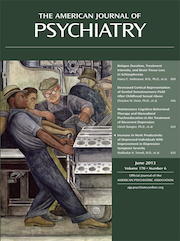Moderators of Outcome in Late-Life Depression: A Patient-Level Meta-Analysis
Abstract
Objective
The authors sought to identify factors that moderate outcome in late-life major depression and that identify patients for whom antidepressants have clinically meaningful effects.
Method
A previous systematic review identified 10 placebo-controlled trials of second-generation antidepressants in outpatients with major depressive disorder who were age 60 or older. For the present study, the authors obtained from the sponsors of the 10 trials individual patient data, including age, sex, duration of illness (current age minus age at onset), course (single episode or recurrent depression), baseline depression severity, treatment assignment, and outcomes. Logistic regression models were estimated and tested to examine the association of potential moderator variables with treatment response and the treatment group-response interaction.
Results
All moderator variables were collected and documented for seven of the 10 trials (N=2,283). Univariate and multivariate analyses were restricted to these seven trials. Illness duration was the only variable significantly associated with drug-placebo differences in the multivariate model. In patients with an illness duration >10 years, baseline depression severity was also significantly associated with drug-placebo differences. In those with an illness duration >10 years and a Hamilton Depression Rating Scale score ≥21, the drug-placebo difference in response rates was relatively robust (number needed to treat=4). In the remaining patients, the drug-placebo difference in response rates was small (46.3% compared with 41.5%).
Conclusions
Older patients with a long illness duration and moderate to severe depression appear to benefit from antidepressants as compared with placebo. Antidepressants do not appear to be effective for older patients with short illness duration.



